You have /5 articles left.
Sign up for a free account or log in.

Wikimedia Commons
The American University of Afghanistan was attacked by gunmen Wednesday. Major media outlets described an explosion and gunfire on the walled campus in Kabul.
Several news accounts reported that 13 people -- seven of them students -- were killed. More were injured. Seven hundred people were rescued.
The New York Times reported that one of those killed was Naqib Ahmad Khpulwak, an assistant professor of law who returned to Afghanistan after studying in the United States -- as a Fulbright scholar -- at Old Dominion University and Stanford University. On Facebook, one of his friends wrote, "I just can't believe we lost one of our own, Fulbrighter Naqib Ahmad Khpulwak, in the last night's attack at American University of Afghanistan. Someone who chose to stay in Afghanistan and serve his country while had all the opportunities to live elsewhere. Totally in shock."
Another colleague posted Khpulwak's photograph to Twitter:
There was no immediate claim of responsibility for the attack on the campus.
As the attack unfolded on Wednesday evening into Thursday morning, news media described a scene in which some students and staff remained trapped for hours.
Reuters quoted one student who said he escaped, injuring his ankle in the process. "Many students jumped from the second floor, some broke their legs and some hurt their head trying to escape," the student, Abdullah Fahimi, told Reuters. "We were in the class when we heard a loud explosion followed by gunfire. It was very close. Some students were crying, others were screaming."
On Thursday morning (U.S. time), the university announced on Facebook that "needless to say, because of the recent terrorist attack on the university, the university's Kabul campuses will be closed until further notice. The provincial centers are open and will operate normally."
Also on Thursday morning, the university sent a statement to reporters: "The American University of Afghanistan suffered a serious attack by armed militants on the evening of Wednesday, Aug. 24, 2016. The university administration is working closely with relevant authorities to assess the damage and to ensure that everyone is accounted for. 'My No. 1 priority at this point is the safety and security of all faculty, staff and students,' said Dr. Mark A. English, president of the American University of Afghanistan. The university extends its sympathy to all affected by this despicable attack. We also want to thank the Afghan government and Afghan National Security Forces for their response to the attack and their ongoing assistance to AUAF. We look forward to being able to continue our important work in service to Afghanistan."
Wednesday’s attack comes just two and a half weeks after two AUAF faculty members – one American and one Australian – were kidnapped by armed gunmen, raising the question of whether the university was being targeted. The university closed the evening the professors were abducted, on Aug. 7, and reopened Aug. 10. “We remain undeterred in our vital mission of providing a quality higher education experience for all our Afghan students,” English said in a press release then.
In January 2014, two AUAF employees -- a student affairs specialist and a political science professor -- were among 21 killed in a Taliban attack on a Kabul restaurant.
The American University of Afghanistan was founded in 2006 and is heavily funded by the U.S. Agency for International Development. It offers English-language, Western-style education -- including coeducation -- to Afghan students. A report issued in 2015 said the university at that point enrolled 1,151 students in degree programs and 934 students in professional development certificate programs, and employed international faculty and staff from 15 countries. A number of AUAF faculty members are American or hold degrees from American universities.
The U.S. Department of State advises U.S. citizens against travel to Afghanistan due to the “continued instability and threats by terrorist organizations against U.S. citizens.” A State Department spokeswoman, Elizabeth Trudeau, said Wednesday that the department is working to locate and assist U.S. citizens affected by the attack.
"We condemn this attack in the strongest possible terms," Trudeau said. "An attack on a university is an attack on the future of Afghanistan."








